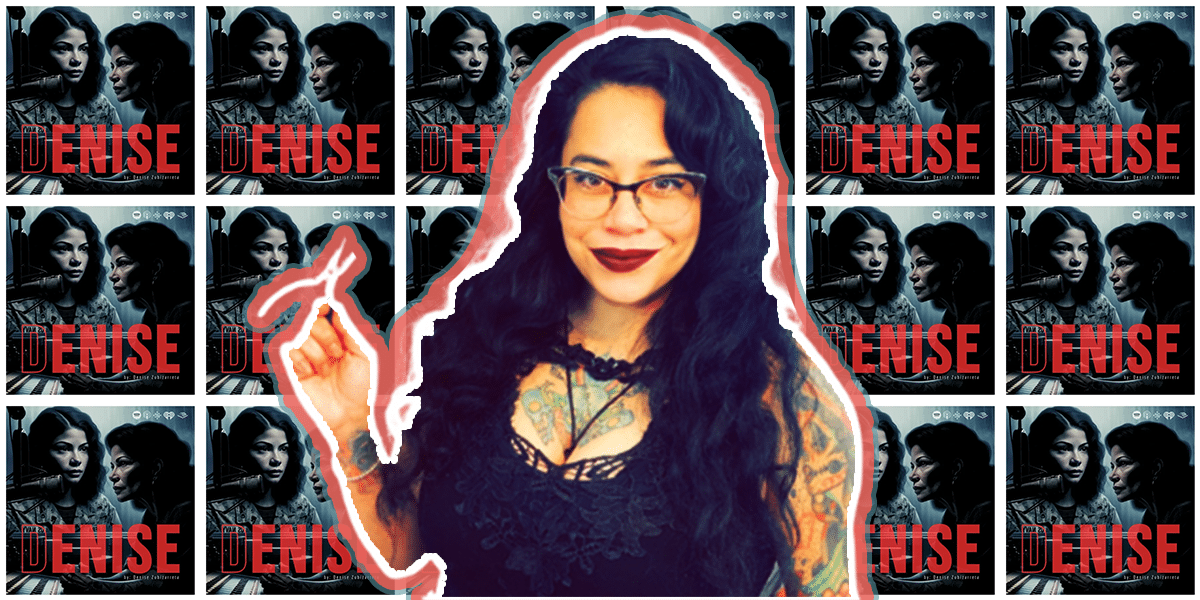Mixed media artist, playwright, and Latina Media Co contributor Denise Zubizarreta is saying the quiet part out loud – about violence against women. In her podcast “Denise,” she puts three different versions of herself in conversation about her experience with abuse in the military.
“Violence against women is pervasive, often hidden behind closed doors, and can manifest in many forms—physical, emotional, psychological, and systemic,” she shares over email. “It transcends boundaries and invades every sphere of women’s lives, whether at home, in the workplace, or in institutions like the military that are meant to protect and serve.”
Zubizarreta’s podcast Denise follows a late-night DJ, her producer, and a young caller. She describes it as “Profoundly personal, emerging from the depths of my own lived experiences.” These three Denise’s are recounting her first marriage to fellow solider Cody, her deployment away from him in Guantanamo, and the relationship’s demise upon her return, including the fallout from Cody’s suicide. She experiences abuse throughout and the audio play dramatizes her different points of view, showing the ways time changes, but doesn’t heal old wounds.
“Originally, the story centered on Cody, but through reflection and collaboration, it became clear that the true heart of the narrative was about Denise – her experiences, mental health struggles, vulnerability, resilience, and the complex realities of life as a woman in the military,” the podcast writer and star explains. By having three Denise’s, the story is both more personal (featuring her perspectives over time) and also more universal, showing abuse as something many women (in the military or not) have in common. On this second point, Zubizarreta says, “The podcast became a space to amplify those authentic, often-hidden stories that many endure but rarely have the opportunity to voice.”
Making it was hard. “Revisiting these memories was not easy – it required me to open up old wounds and confront moments of vulnerability and loss,” she confides. But it was worth it, allowing her “to craft something that transcends my own experiences and becomes a testament to the human spirit’s ability to endure, adapt, and find meaning in even the most challenging circumstances.”
The podcast certainly does that, in part by highlighting Zubizarreta’s experience but not getting stuck in it. “It weaves together memories, struggles, and moments of resilience that have shaped who I am, blending factual events with a layer of creative interpretation to build a narrative,” she shares. “While some details were adjusted for narrative flow, the emotional core remains true to life, echoing the pain, strength, hope, and doubt that I’ve encountered on this journey.”
Zubizarreta was not alone in crafting the story, collaborating with Flamboyán Theatre and sound engineer Veronica Straight-Lingo, who Zubizarreta credits with “bringing us through shifts in time and place using only sound.” Together, this team creates an audio experience, far beyond your typical podcast.
Listening to “Denise” can be a disorienting experience – parsing the timelines, listening to the trauma, wadding through the guilt and thorny reactions to the play’s events. But it’s rewarding, a reminder that women do not need to suffer, process, and survive alone. We can support each other along the way and bring these conversations out of the shadows. After all domestic violence and abuse in general are common – with one in four women experiencing gender-based violence in our lifetimes. And the rates are only higher in the military.
It doesn’t have to be that way. For her part, Zubizarreta hopes that her podcast inspires conversations that “lead to meaningful accountability for perpetrators, systemic reforms that prioritize the safety and dignity of women, and comprehensive support structures for survivors.” I hope so too.

“Denise” is available on Spotify and wherever you get your podcasts. If you or someone you know is experiencing gender-based violence, contact the National Domestic Violence Hotline. For Latina-specific resources, visit Esperanza United.

